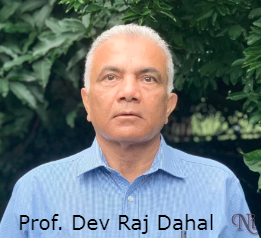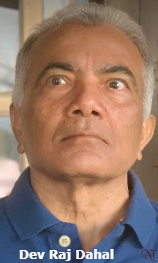Professor Dev Raj Dahal
Senior Political Scientist/Analyst
Nepal

The purpose of education, according to Vedas, is to make individuals capable of introspection, self-realisation and total consciousness of life and the outside world. It helps them to discover three scopes underlying their drives:
naturalness of biological drive of persons of the first heritage, socialised humanity of the second heritage and elevated scale of divinity of the third heritage where they developed immense cosmic ideas seeking to transcend the first to acquire the second and the third heritage of knowledge.
It offered them refreshing fullness and blissful life freed from the tragedy of internal and external entanglements. A sane Nepali cannot escape from the unbroken link of the nation’s philosophical thought that evolved for thousands of years through oral tradition, contemplation and inquiry about the written scripts.
Even in ancient days, rishis (sages) had taught people that educated persons are the mediators of human and cosmic spheres beyond the dilemma of subjectivity and objectivity. They explored the knowledge of the ideal future, like Voltaire, unbound even by the bondage of Vedas. They changed knowledge in tune with changing sanatan dharma, the zeitgeist and even obliging the rulers to catch its spell in the statecraft. Many sages served as example unveiling that human greatness flows from their virtues which are approved by others.
Knowledgeable persons were required to assume responsibility in public life. It, therefore, entailed not limiting the light of knowledge to self which becomes onerous but radiating it like mature and fulfilled individuals even to the gain of yet to be born.
They assumed duty to other human beings and species upon whom they survive and prosper. It necessitated faith in self, not faithlessness, which loses confidence and is bound to crawling and clinging to earthly ambiance without life-affirming assurance and improving the soul, mind, heart and habits. Arthur Schopenhauer rightly claims human beings “metaphysical animals’ capable of thinking above the earth and refining sublime expressions of love to intangible, superhuman sources of knowledge to bring Platonic happiness to the whole world.
The concept of brahman (intellect) in the past was clarified by using the method of neti neti, an idiom which means “not this, not that”, that is by negating everything that is not brahman, discovering core thought of elevating self to the practice of humanity and spirituality and performing niskam karma (worthy action) without any motive to gain profits and power.
The modern commercialisation of public good, including health and education, has drained the life of ordinary Nepalis from themselves and inverted the very purpose of public education the ancients esteemed. With all the public and health systems of the nation in infirm condition, most Nepalis find it hard to leap forward to emerald life and recharge their batteries through access to public education and innovation.
As a result, they are soiled by cynicism against modern elites’ desire for merit waltzing around the global sphere. Nepali sages argued that knowing self can help control instinct, impulse and violent behaviour that tend to dominate and oppress others, not liberate them and spur inner peace considering that every living species the nature has produced stands a divine purpose as Ayurveda discloses that every plant has medicinal value which the science has yet to discover. The dawn of faith in self and openness to the condition of existence helped Nepalis to attain emancipation transcending all differences in social hierarchy, knowledge and culture.
It means all the ancient treatises of the nation sought not social control but social emancipation of the people through the primacy of knowledge over state power, wealth and authority because they discovered that prana (breath of life) is common to all living species. They were allowed to exist and prosper. This discovery has also set the connection between living species and matter.
Each living species imbued with the common heritage of nature holds a supreme value of its own and must not be sacrificed to the claim of economic growth, society and even mankind. Rishis standing above the rulers in knowledge were capable of creating the culture of peace in many spheres of life.
The true knowledge of Isa Upanishad, according to F. Max Muller, is “while enjoying the fruits of creation, one should not covet for others’ possessions; one should partake the means of livelihood to the minimum and conserve the resources available in the universe for others to meet their requirements.” This natural world, however, keeps its balance. Both animals and plants do not hoard excess food for eating more than they need for their survival.
They leave the resources in nature for others. Nature’s resilience requires the abolishing brutal way of living through over accumulation, not engaging in the sustainable production of essential goods and keeping resources for sharing and caring for the future generations and other species affirming the modern notion of sustainability.
Knowledge about caring for coming generations is a worthy goal to spawn opportunities for social and intergenerational justice and keep reciprocal duties. Nepali state is suffering from a lack of caring culture now. This condition marks the betrayal of love, loyalty and bond and huge outflow of natives abroad in search of livelihoods. Ancient education contrasts with the pursuit of modern knowledge based on a culture of excessive economic growth, consumerism, materialism and greedy lure of Charwakian sort at the cost of nature’s resilience, the life of the poor and the survival of species beings.
The growth of the frontiers of disciplinary knowledge, specialisation, trick of management, calculating politics and the culture of skewed modernity now only portent the shaky nature of its evolution with the onset of vicious tools of denial of basic needs, violence and destruction of nature. The bondage of the ego of elites marks the decay of melodious life, the resonance of coming of a democratic order.
It exposes a gap between great human achievement in the ancient organic knowledge and morality and corresponding loss of modern wisdom now in spite of the practice of human rights, democracy, popular sovereignty and right to education. The dawning of true knowledge springs from self-awareness, which according to sage Astavakra, is supreme, beaming and delightful in itself. To him, once individuals dispel their ignorance through pure intellect they become aware of tattwogyan (ontological truth) about the operation of the phenomenal world, discover the meaning of life in becoming human in this modern world and find the oneness of life-world. The shattered fragments of disciplinary knowledge applied in Nepali society, however, present a false remedy to the integrated malaises.
Social science theories of rational choice and the creed of elites combining in-group affinity and out-group competition and conflict rooted in interests, ideologies and identities in no way optimise them in the golden mean Buddha articulated. One should excavate and relearn what history, tradition and philosophy of Vedas and Upanishads have taught to collect these fragments of knowledge into a distilled form of wisdom that can release Nepali passion from deep sleep, drive knowledge growth in discursive and reflective mode as ancients did, use them for public welfare and make life harmonious with truth, nature and culture.
Most of troubles of Nepal arose out of aloofness of intellectuals from ethical principles, use of knowledge as power rather than emancipate it from the irrationality of power and productively use it for continuous production of knowledge, use it for socialisation of public and utilise for the crafting of public policies for general welfare. Now knowledge growth without human feeling, experience and language of national culture or rented from outside with enough logical erudition but without a common zone of national sentiment, emotion and attachment to the context and connections to the people can hardly muster its approval, validation and utility.
Nepal does not have any monitoring means of who is producing what kind of knowledge, culturally embodied or disembodied, for public policy use, socialisation and nation building. It is here leadership is defined by the obligation to respond to the needs of people and the nation rather than renounce every bit of sane, enduring knowledge ancestors have produced without any fear of martyrdom of Socrates type. All dreadful tremors have stemmed from the basic attitude of Nepali leaders and the rationalising attitude of their intellectual devotees in various spheres, not fertilising relevant knowledge through the use of scientific canon and their applications to ease the burden of life and labour.
National amnesia:
Both hold the feeling of superiority over people, lack personal conscience, frozen in the sterility of vision and indulged in exposing each other’s naked praise of partisan ideas and interests. This has inflicted collective national amnesia. One can now find their fatal dissociation from the ordinary Nepalis. It is spurring a tension between faith, humanity and science.
Modern teachers, intellectuals and political leaders’ attitude of know-all-knowledge only justify their prejudice, inhibit them to learn new ideas essential to bring change, connect with the people to alleviate their sufferings and engage in conscious orientation to sustainable social development Nepal’s ancient heritage has treasured. The clashing modes of indoctrination of people silenced national awareness and stigmatised the other, devalued the native essence of aham asmi, burning thirst of free will and the Tao of human’s socialised nature, norms and life.

The time has come for Nepali intellectuals and leaders to disentangle from the fake glow, falsify the belief that humankind is the measure of all things, not nature and enforce the accountability of knowledge, power and wealth to people.
An absurd caricature of everything only incubates artificial life stripped of native emotional attachment to the people, lore and the land. It is vital to indigenise universal knowledge to fit local conditions and avert the nation plunging into either a cognitive cringe or absolute nostalgia.
# Thanks Professor Dev Raj dahal, Kathmandu, Nepal: Ed. Upadhyaya.
# Our own contact email address is: editor.telegraphnepal@gmail.com
